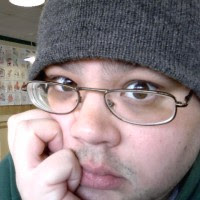So I'm four days late on this (and didn't write about every episode this season, as I originally intended), but after the series finale of The Sopranos, one question immediately comes to mind:
Tony Soprano is a Journey fan?
How cool is that? I bet him and Carmela rocked out to Escape in the car when they began dating. Hey, maybe Meadow or A.J. was conceived while listening to Journey! That's what that final scene was supposed to mean! I know a lot of people hated the final episode - or perhaps more specifically, how it ended. How do I know? Because I spent most of Monday morning avoiding virtually every radio and TV broadcast I could've been exposed to in an attempt to "stay fresh" before I finally watched my recording. Why didn't I just watch the damn thing on Sunday night like everyone else? Well, that's a good question. I'll just let you imagine what I was doing and that will be the story.
I know a lot of people hated the final episode - or perhaps more specifically, how it ended. How do I know? Because I spent most of Monday morning avoiding virtually every radio and TV broadcast I could've been exposed to in an attempt to "stay fresh" before I finally watched my recording. Why didn't I just watch the damn thing on Sunday night like everyone else? Well, that's a good question. I'll just let you imagine what I was doing and that will be the story.
Ha! See what I did there? (Actually, I would've finished this Tuesday night if Justin Verlander hadn't thrown a no-hitter for the Detroit Tigers.)
Look, I totally understand why so many people were ticked off. They wanted a definitive ending. They wanted affirmation for their months (years!) of speculation. They wanted resolution. They didn't want a final moment that made many of us wonder if the cable or satellite feed had gone out. (Did anybody else count how long the screen was black and silent until the first credit rolled? I counted seven seconds.) Unfortunately, David Chase crushed those expectations like that Ford Expedition crushed Phil Leotardo's head. (Nice sound effects on that one, by the way.)
Some have said it was a cop-out. That was the exact term used by one of my favorite baseball writers, Buster Olney. He said he was always taught that a story needs a beginning, a middle, and an end, and for Chase not to finish off his masterpiece was a disservice to everyone who followed the show. I admire Olney's work tremendously, and if he's on ESPN to talk baseball, I'll stop what I'm doing to listen. But in this case, I disagree with him. And I'm sure Chase is feeling pretty good about his decision right now. Would everyone be talking so much about that ending if Tony Soprano had been killed? Or if he packed the family up in a SUV and bolted for Canada? No wonder he's not interested in defending the final episode he created. Chase made sure his series would stay alive in people's minds for years - if not decades - to come.
And I'm sure Chase is feeling pretty good about his decision right now. Would everyone be talking so much about that ending if Tony Soprano had been killed? Or if he packed the family up in a SUV and bolted for Canada? No wonder he's not interested in defending the final episode he created. Chase made sure his series would stay alive in people's minds for years - if not decades - to come.
I'll admit, however, that I'm probably looking at this much more as a writer than as a TV viewer. And very often, the two are difficult for me to separate. I enjoy an ending that makes me think about something long after I watched or read it. I love having discussions with other people over their interpretations of a hazy ending, and hearing how they might have differed from mine.
Of course, I could be a little sensitive because I've tried to take much the same approach into my own creative writing (of which there unfortunately hasn't been much since I started this blogging stuff), and have been on the receiving end of some blistering critiques in fiction workshops because of that. I heard many of the same criticisms: "You didn't know how to end this story." "This was a total cop-out." "I feel like you wasted my time." And if that's how those people felt, that's fine. It's perfectly valid. But my classmates also discussed where they saw the characters going, and that's what I really wanted the reader to do.
Using those types of artistic arguments or saying the finale was like real life because nothing's ever truly resolved will just make some people's eyes roll. As I said, I understand that. Hey, I wasn't so "zen" about the ending when I first watched it, either. But the more I think about it, the more I feel it really was the best way to end the show.
If you think the person who walked into that door was Tony's killer, and that's the last thing he saw, then that's how the series ended for you. If you think it was Tony's daughter, Meadow (which I'm not sure it was because of the look on Tony's face), and the Soprano family simply had dinner that evening, that could've happened, too.
But I think Chase was going for something bigger. He wanted us to feel as tense and suspicious as Tony was in that moment. And the use of "Don't Stop Believin'" served to echo those feelings of anticipation and dread. The song starts out quietly with just vocals and piano, only to slowly build by adding guitars, and then after the line "it goes on and on and on and on," the bass and drums kick in for the full chorus. The high-pitched build-up was very reminiscent of the scene with "Sister Christian" in Boogie Nights.
Who was that strange guy sitting at the counter? Why did he look back at their booth? What will he do when he comes out of the bathroom? "Strangers... waiting," as another lyric from the song goes. Tony may have looked up when the door opened because he was expecting Meadow. But he was also keeping an eye on whoever else walked in. Because he will always have to keep an eye on who walks in the room. He will always be looking up when a door opens. It doesn't matter if Phil Leotardo's dead. Someone else will come along, as happened throughout the series. "Hiding... somewhere in the night." It won't stop.
As Paulie Walnuts might say, students are gonna write disserations on this $#!+. Yeah, that's right. About The Sopranos and Journey. It was brilliant. But David Chase doesn't even need my applause. He's sitting in a comfortable armchair somewhere, reveling in the knowledge that his show's place in TV immortality is assured.
Thursday, June 14, 2007
"It goes on and on and on and on..."
Posted by
Ian C.
at
2:00 PM
![]()
Labels: The Sopranos, TV
Subscribe to:













